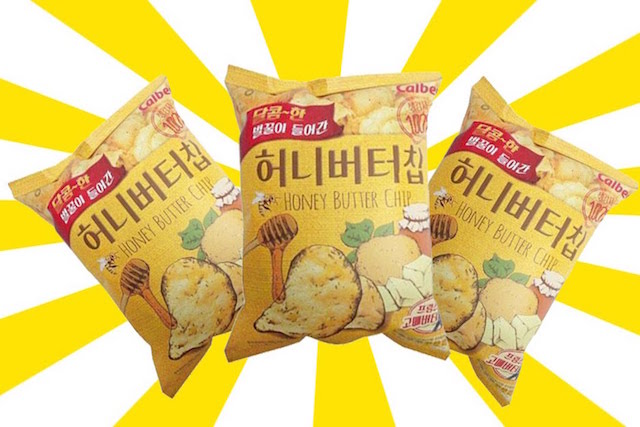Published 22 July 2016
U.S. exporters credit one factor in particular for boosting the wide availability of American potatoes in Korea: free trade.
In 2013, a group of teenagers in South Korea made international news when they were booted from a McDonald’s after buying $250 in French fries. The teens had hoped to host a “potato party” – a fad then sweeping South Korea and Japan. Since then, Koreans have kept up their love affair with potatoes.
The latest obsession: “honey butter” potato chips. Introduced in August 2014 by the Haetae Confectionery & Food Co., the salty-sweet snacks are a national obsession, endorsed by celebrities and K-Pop stars, and sometimes in such scant supply that chip scalpers have created their own market. Vice reported that two bags of the coveted chips sold on eBay for $103.50.

Image credit: heyeonni.com
Among the chief beneficiaries of the current Korean passion for potatoes are U.S. potato growers and processors, who’ve seen their exports explode in recent years. According to the U.S. Potato Board, U.S. potato exports hit a record high of $1.76 billion in 2014, shipping out 1,643,618 metric tons of potatoes. In 2015, potato exports slipped seven percent to $1.62 billion, still the third highest level of all time.
South Korea is now among the top global destinations for U.S. potatoes, after Japan, Canada, Mexico and China. The U.S. Department of Agriculture reported that exports of fresh potatoes to Korea grew by 22,000 metric tons – or 49 percent– from 2014 to 2015 alone. The growing need for fresh spuds generated an additional $12.7 million in value last year, driven primarily by Korean consumers’ craving for snacks like honey butter potato chips.
U.S. exporters credit one factor in particular for boosting the wide availability of American potatoes in Korea: free trade.
Many variables account for why some food trends take off and others don’t. But U.S. exporters credit one factor in particular for boosting the wide availability of potatoes in the Korean market: free trade. In particular, growers say, exports have ramped up dramatically since the approval of the U.S.-Korea Free Trade Agreement by Congress in 2011. Among other things, the agreement ended an 18 percent tariff imposed by Korea on U.S. exports of frozen potatoes, thereby lowering prices for Korean consumers and breaking the market wide open for American potatoes.
The potato boom has been especially good for Washington State, whose “potato economy” is worth $4.6 billion a year, according to Matt Harris of the National Potato Council. Washington State (not Idaho) accounts for 70 percent of U.S. potato exports, says Harris, and the potato trade supports 23,500 related jobs. Since the passage of the U.S.-Korea free trade deal, Harris says, Washington State’s potato exports have grown by 72 percent, and in 2014, South Korea bought $62 million of Washington State spuds.
“Lower tariffs under the TPP helps level the playing field. And then you can let your product do the talking for you.”
Jason Davenport, president and co-owner of Allied Potato, Inc., says he doubled his workforce to 40 in the past few years, thanks largely to year-on-year double-digit growth in exports to Asia. Davenport’s firm grows, packages and ships potatoes from California and Washington State. In particular, the company specializes in “chipping” potatoes – special varieties of spherical spuds that can fry up into the perfect honey butter chip.
Lower tariffs under the Transpacific Partnership agreement (TPP), says Davenport, helps level the playing field with his global competitors. “And then you can let your product do the talking for you,” he said. Among the countries that Davenport says he hopes will lower its tariffs as a part of TPP is Vietnam.
The success of TPP could mean the birth of new global consumer trends as a burgeoning global middle class gains better access to American goods. The result would be a win not just for the world’s consumers but for American exporters – and a steady supply of honey butter chips.
This piece first appeared at Republic 3.0.
© The Hinrich Foundation. See our website Terms and conditions for our copyright and reprint policy. All statements of fact and the views, conclusions and recommendations expressed in this publication are the sole responsibility of the author(s).





